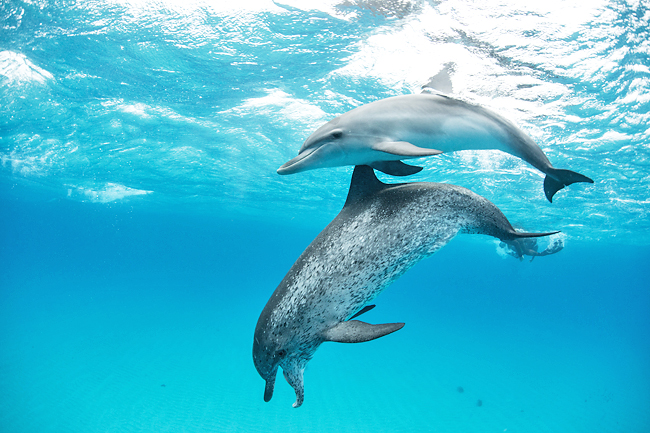Dino Grandoni
THE WASHINGTON POST – With a hand signal from a trainer, Delta and Reese were off.
Swimming in separate directions and calling each other underwater, each made sure the other was in position before pushing their bottle-shaped noses against the docks.
A whistle let the dolphins know they succeeded at simultaneously pressing the two buttons at opposite ends of a lagoon about as long as a tennis court. The pair hurried back to the trainers for their favourite treat: fish.
But the game, which Delta and Reese have played dozens of times, was made all the more harder by a loud, thumping noise underwater, part of an experiment at the Dolphin Research Center in the Florida Keys.
The dolphins needed to “shout”, researchers say, to work together. The findings, which were published recently in the journal Current Biology, show dolphins struggling to communicate above the din, a worrying sign as people pump Earth’s oceans with buzzes, beeps and other blaring noise pollution.
“These results really highlight the need to account for how noise affects group tasks in wild animals,” said Behavioural Biologist and doctoral candidate at the University of Bristol in England Pernille M Sorensen, who co-wrote the paper.
Around the world, much of nature is no longer quiet. Birds, bats and other animals that depend on sound to forage and find mates are becoming increasingly disoriented in a world made louder by human activity, a growing group of scientists said. Not even national parks are spared.

Some bluebirds are so stressed out by noise pollution, past research shows, that they have hormone levels similar to people with post-traumatic stress disorder.
Under the sea, the ruckus from boat traffic, offshore drilling and submarine sonar can be sensory overload for aquatic life.
Belugas dive away from the rumble of ships. Grey whales stop their songs when confronted with loud noises.
Few rely more on sound to understand their underwater world than bottlenose dolphins. The new study is among the first to show how acoustic pollution affects animal cooperation.
“On the whole, anthropogenic noise has been more extensively studied in terrestrial environments than in aquatic ones – in large part because humans are terrestrial and tend to care more about the spaces in which we live,” said a lecturer in education studies at the University of Exeter Caitlin Kight, who has studied animal communication.
Dolphins use echolocation to hunt and employ a repertoire of high-pitched whistles to communicate, some of which function like first names in “dolphinese”. Males in Australia’s Shark Bay have been found whistling to corral mates and even maintain relationships with dolphins outside their pod.
As far as dolphin lives go, Delta and Reese have it easy. Trainers taught the longtime research subjects to play the button-pushing game and perform other tasks for food.
Delta is “sweet” and “sociable”, according to the centre’s research specialist Abigail Haddock who also co-wrote the paper. Reese is the “A-plus student”, she said.
“You can just see him like a kid at the front of the classroom,” Haddock said. “He’s always eager to see what’s next.”
Equipped with suction-cup sound recorders behind their blowholes, the dolphins changed the length and volume of their calls and reoriented themselves to face each other as the static sound from a submerged speaker got louder.
“They raised their voices, if you will,” Haddock said.
But the research team discovered there was only so much the dolphins could do to overcome the simulated noise pollution. Delta and Reese’s success rate at pushing the buttons within a one-second window of each other dropped to just over 60 per cent when noise was at its highest, compared with 85 per cent when the research team played no sounds.
“This is sophisticated, complex behaviour that, in some ways, represents a sort of evolutionary pinnacle,” Kight said in an e-mail. “This research is very sobering because it reveals that we humans cause noise pollution that is probably threatening these sorts of incredible interactions in the wild.”







